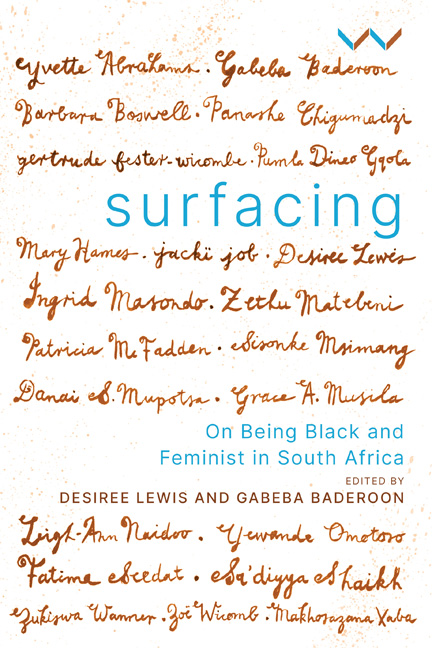Book contents
Introduction: Being Black and Feminist
Published online by Cambridge University Press: 15 April 2021
Summary
surface (n, v, adj)
noun
outside, covering, skin, face
verb
rise, arise, come up, come to the surface, reappear, materialise, come
to light
adjective
outer, outside, apparent.
Journeys through identities and knowledge-making
‘Surfacing’, especially in this book, has many meanings. In the most immediate sense, it may mean that those who have not spoken in public spaces now do. But black South African feminists have always spoken – through action, creativity and words. Many came to prominence during the anti-apartheid struggle in the 1970s, but others were visible before then. Several constellations of black feminist South African writing flourished in different regions and cultural forms. The significance of these constellations, as well as iconic figures such as Sara Baartman, Winnie Mandela and Miriam Tlali, has been severely neglected in the archiving of South African cultural and political traditions.
This book starts to address these omissions. It acknowledges the depth of a body of black feminist thought while also recognising the limitations of surveying the terrain. No collection is definitive. Nor can it be representative of a given topic or of a single group: there are always fractures, omissions and silences. Bringing together this group of black women writers conveys some of the key connections and dialogues among perspectives and voices that continue to be sidelined in publishing, scholarship and public debates in South Africa.
What kind of knowledge matters is linked to the question: Whose knowledge matters? The rapid rise of identity politics has been important to democratic struggles from the late twentieth century to the present. As the collection shows, the personal essay is well suited to the standpoint knowledge of subjects who have been silenced, stereotyped and politically subjugated. Globally, the essay form has been deftly crafted by black feminists including Audre Lorde, bell hooks, Michele Faith Wallace and, in Southern Africa, Zoë Wicomb, Bessie Head and Patricia McFadden. As storytellers, scholars and poets, these writers have demonstrated that big ideas need not be anchored in what are conventionally seen as ‘big forms’ – such as the academic article. Concision, wit, poetic force and autobiographical storytelling in the personal essay can carry enormous weight. As the poet and academic Danai S. Mupotsa illuminates, potent essay writing is the product of dense thought, autobiographical reflection and forms stretched to their creative limits.
- Type
- Chapter
- Information
- SurfacingOn Being Black and Feminist in South Africa, pp. 1 - 14Publisher: Wits University PressPrint publication year: 2021



